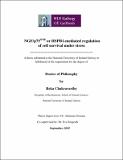| dc.contributor.advisor | Gorman, Adrienne | |
| dc.contributor.author | Chakravarthy, Reka | |
| dc.date.accessioned | 2016-02-10T14:05:30Z | |
| dc.date.issued | 2016-02-09 | |
| dc.identifier.uri | http://hdl.handle.net/10379/5548 | |
| dc.description.abstract | Triple negative breast cancers (TNBC) lack estrogen, progesterone and HER-2 receptors rendering them insensitive to current hormone targeted therapies. However, TNBC have been reported to express and secrete an additional growth factor, Nerve Growth Factor (NGF). They also express the two cognate receptors, the 75 kDa neurotrophin receptor (p75NTR) and the tropomyosin related kinase A receptor (TrkA) to which NGF can bind. Identifying NGF -mediated p75NTRsignaling is a potential therapeutic target for TNBC.
Using MDA-MB-231 cells, a representative of TNBC I confirmed a role for NGF-mediated pro-survival signaling through p75NTR. It is well known that NGF signaling through TrkA mediates cancer cell proliferation, while its signaling through p75NTR protects breast cancer cells from apoptosis. Therefore, targeting NGF/p75NTR signaling could potentially sensitize cells to chemotherapeutics. In this study, shRNA targeted to p75NTR to knock down the receptor or inhibitors designed to disrupt the NGF/p75NTR signaling were used and it was found that disrupting NGF/p75NTR signaling sensitized TNBC cells to apoptosis. The findings also illustrate that NGF regulates the levels of p75NTR through two distinct mechanisms, post-translational and transcriptional. Firstly, using Western blotting it was found that exogenous NGF inhibits the endogenous processing of p75NTR. Secondly, it was shown that exogenous NGF increased p75NTR mRNA transcription as determined by RT-PCR. A differential sensitivity of the cells to apoptosis induction was observed with and without induction of p75NTR by NGF. This regulation of p75NTR by NGF is linked to increased resistance of these cells to chemotherapeutic drugs. Alteration in NGF signaling is not only implicated in resistance of breast cancer to chemotherapeutic reagents but it is also associated with a number of other disease states.
Previous work in our group involved the design and generation of NGF variants with a view to using them to selectively target Trk or p75NTR receptors. Here these variants were produced in HEK293T cells and their biological signaling was examined. Eight NGF variants were chosen and expressed into the media of HEK293T cells. The concentration of the variants was determined using an NGF ELISA followed by the analysis of TrkA-induced pro-survival signaling. The I31R and R69D NGF variants displayed no TrkA pro-survival activity as they were unable to protect PC12 cells from TG induced cell death. Interestingly I31R displayed no TrkA activity but retained binding affinity to p75NTR. I31 residue on NGF was identified as a target to disrupt TrkA signaling in disease conditions.
The second part of the thesis focused on the pro-survival signaling mediated by the intracellular ER chaperone protein HSPB1 in response to ER stress. HSPB1 that belongs to the family of small heat shock proteins is a potent regulator of apoptosis. However, the role of HSPB1 in ER-stress induced apoptosis has not been delineated. Previous work in the lab has shown that thermal pre-conditioning can protect cells from ER stress induced cell death through its ability to regulate BH3 only protein, BIM. Here it is shown that overexpression of HSPB1 protected PC12 cells from ER stress induced apoptosis through ERK-mediated phosphorylation of BH3 only protein, BIM leading to proteasomal degradation of BIM. It is also shown that HSPB1 interacts with phospho-ERK 1/2 and BIM to mediate a cytoprotective effect against thapsigargin-induced ER stress. I also characterized the effect of mutations in HSPB1 in response to ER stress in PC12 cells. PC12 cells that stably expressed mutations in HSPB1 showed an inability to confer protection in response to ER stress and were unable to mediate degradation of BIM as they did in their wild type counterpart. | en_IE |
| dc.rights | Attribution-NonCommercial-NoDerivs 3.0 Ireland | |
| dc.rights.uri | https://creativecommons.org/licenses/by-nc-nd/3.0/ie/ | |
| dc.subject | NGF | en_IE |
| dc.subject | p75NTR | en_IE |
| dc.subject | Triple negative breast cancer | en_IE |
| dc.subject | HSPB1 | en_IE |
| dc.subject | BIM | en_IE |
| dc.subject | ERK | en_IE |
| dc.subject | PC12 cells | en_IE |
| dc.subject | Charcot-Marie Tooth disease | en_IE |
| dc.subject | Biochemistry | en_IE |
| dc.title | NGF/p75NTR or HSPB1-mediated regulation of cell survival under stress | en_IE |
| dc.type | Thesis | en_IE |
| dc.contributor.funder | PRTLI10 | en_IE |
| dc.local.note | This work has focused on how combined targeting of growth factor (NGF) and its receptor (NGFR) can sensitize breast cancer cells to death; identified targetable residue on NGF to disrupt NGF/TrkA signaling to understand NGF receptor imbalance in disease ; understanding the mechanism of chaperone (HSPB1) mediated attenuation of ER stress induced cell death. | en_IE |
| dc.description.embargo | 2020-02-08 | |
| dc.local.final | Yes | en_IE |
| nui.item.downloads | 1880 | |


